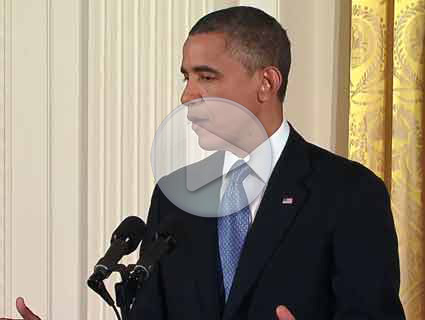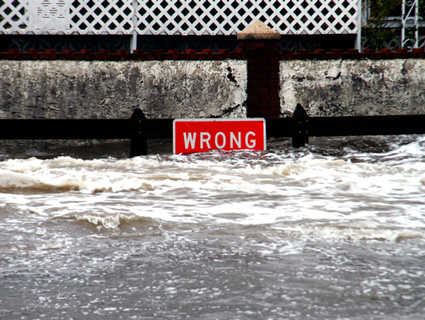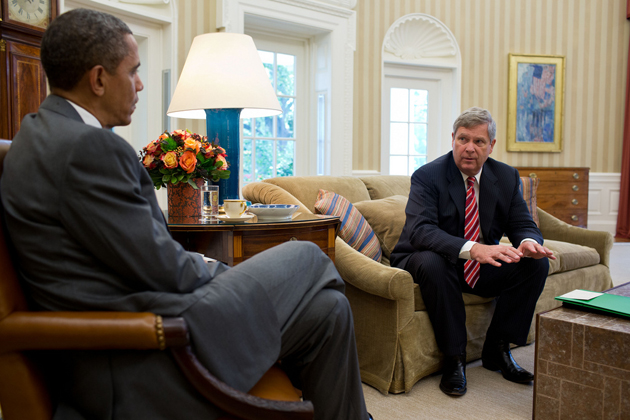Climate change’s single appearance in the presidential debates was, well, anticlimactic. At the end of the second bout, after the candidates sparred interminably over whose love for fossil fuels was greater, moderator Candy Crowley said she’d decided not to call on an audience member who wanted to ask about global warming. “I had that question, all you climate change people,” she said. “We just, you know, we knew that the economy was still the main thing.”
And there it is, everything you need to know about the Beltway mindset in one compact little diss. Climate change has been demoted to special, you-people interest on the order of, oh, animal testing or nuclear disarmament. Important, sure, but not like the things that grown-ups care about, like whether America can afford another nickel at the pump. Or, for that matter, whether Joe Biden played dirty pool in the VP debate by blinding Paul Ryan with his 500-watt smile. In November, the liberal media watchdog Media Matters took the trouble to count up how much time the major networks (minus MSNBC) had devoted to the vice presidential grin: 91 minutes. Climate change, on those same networks, had taken up a grand total of 51 minutes in the preceding three months.
We’ve seen this disaster movie before: As Hurricane Sandy headed toward the East Coast, ThinkProgress noted that of 94 major-newspaper stories about the coming storm, not one had mentioned climate change or even “extreme weather.” Last summer, a study found that only 1.6 percent of TV coverage of the wildfires across the West had so much as nodded to global warming.
Fine, you might say, but what’s new? Ever since cap and trade bled out in the Senate, climate policy has reeked of defeat. People who know political realities don’t go near it.
Let us pause here to contemplate what media critic Jay Rosen has termed the Church of the Savvy, a.k.a. the media-politico (and Politico, but that’s another story) mind meld that determines who, and what, gets taken seriously in Washington. In the Church of the Savvy, the greatest sin is to insufficiently kowtow to political realities as defined by the congregation. The will of the public is assumed to be perfectly expressed by the rituals of DC, from sermonizing about the partisan outrage du jour to the liturgical chants over how Americans yearn for bipartisanship. This leads to a neat bit of circular logic: Climate change is a losing issue; therefore we don’t talk about it; therefore it’s a losing issue. QED.
In fact, Americans are well ahead of the Savvy when it comes to climate change. In a 2011 Stanford University study, 77 percent said they’d support a candidate who said climate change is real, humans are the cause, and cleaner energy is needed. In a Yale/George Mason University poll last March, independent voters were almost as likely as Democrats to say climate change was a key issue in determining their vote (58 percent and 63 percent, respectively)—and even 43 percent of Republicans felt that way. And just before Election Day, 68 percent of likely voters told pollsters that climate change was a “serious” or “very serious” issue. In exit polls, 41 percent said Obama’s response to Sandy was an “important” or “very important” factor in their vote. Coincidence? Perhaps not: 60 percent of voters told pollsters that climate change “made Sandy worse.”
In other words: It’s only the terminally Savvy who patronizingly assume Americans can’t see any farther than their gas gauge. And that group, sadly, may include the president, who on the campaign trail offered only a meek assurance that “climate change is not a hoax.”
That’s nice. But stating the painfully obvious hardly earns points for bravery. No one outside the data-denying precincts of the hardcore right truly believes that climate change doesn’t exist; the debate is over what to do about it. And on that front, the president has offered a big lump of meh. At his first postelection news conference, he ventured that “the American people have been so focused on our economy and jobs and growth that if the message is somehow, ‘We’re going to ignore jobs and growth simply to address climate change,’ I don’t think anybody’s going to go for that.”
It was tough to tell whether the president was mouthing Church of the Savvy precepts, or just showing the strain of Solyndra smears. Either way, jobs vs. climate action is a straw man—a false and outdated dichotomy propagated by those with a vested interest in the status quo. For the economy as a whole, the number crunchers have shown that tackling carbon emissions (via, take your pick, a carbon tax, cap and trade, or flat-out regulation) might cost the economy about 1 percent of GDP by 2050. Not doing so, however, will cost anywhere from 5 to 20 percent—20!—of GDP. (By way of comparison, after the 2008 crash, GDP declined 2.4 percent.)
And that’s not “will cost” as in “we’ll pay sometime down the road.” It’s as in: Sandy’s damage stands at $50 billion, minimum. Last summer’s wildfires cost Colorado at least half a billion; the drought’s price tag could be as high as $150 billion. Yes, yes: No storm or fire is attributable entirely to climate change, but scientists have no doubt it’s making them worse and more frequent. Meanwhile, a UN-sponsored study estimates that corn, wheat, and rice yields will drop by as much as one-fifth by 2050 if nothing is done. The planet of 2100, in World Bank president Jim Yong Kim’s words, will be “so dramatically different from today’s world that it is hard to describe accurately.”
We can’t afford to keep paying the price of inaction—to pump out subways, to lose firefighters in exurban infernos, to let crops wither as we struggle to feed even more people. (Fun fact: Flood insurance is the second-biggest federal fiscal liability after Social Security.) Nor can we afford to keep letting Germany and China eat our lunch on solar tech. And if you want a truly terrifying forecast, talk to reinsurance executives, who ultimately pick up the tab for the extreme weather events that, they calculate, have nearly quintupled in the past 30 years in North America alone.
That, not some ’90s hoo-ha about jobs vs. polar bears, is the pitch to make to the American people. It’s Obama’s job—though not his alone—to explain the return on investment, the way Bill Clinton finally broke down Obamacare’s cost-benefit sheet in his convention speech. Instead of fretting about jobs vs. climate, show that the real question is fewer jobs vs. more jobs—that is, a disaster economy that scrambles to put out fires, or an adaptive one that aims to prevent them.
The president is now entering legacy territory. He has secured a place in history for turning back, twice, the racial demons that haunt America’s politics. But that achievement may be tarnished if he’s also recognized as the last president who had a chance to, in Mitt Romney’s sneering phrase, “begin to slow the rise of the oceans”—and didn’t.
In fact, slowing the oceans’ rise is not as hard as it’s been made out to be—certainly not compared to nearly eradicating slavery worldwide, to making once-routine infant and maternal mortality a rare tragedy in all but the poorest countries, to going from typewriters to iPads in a generation. Just make it expensive to needlessly pump carbon into the atmosphere, and capitalism does much of the rest. It’s happening now in California, the world’s ninth-largest economy, which last fall implemented a cap and trade system, yet failed to be plunged into darkness by a collapsing energy sector.
To be sure, anything you can demagogue as an “energy tax” is a tough slog in a Congress where the Party of No holds sway. But Obama has plenty of other tools, beginning with, but by no means limited to, the bully pulpit. From the Pentagon—which already considers climate change when planning wars and powering bases—to FEMA, every federal agency needs to be put on the path of adaptation. And, of course, there’s the big mitigation stick: the EPA’s power to regulate carbon as a pollutant under the Clean Air Act, which has been affirmed by the (yes, Roberts-era) Supreme Court. The administration has begun heading cautiously in this direction, but getting as bold as circumstances demand will put Obama on a collision course with an industry—coal—that causes the worst emissions and employs a lot of people in states like Ohio. Energy execs will fight tooth and nail, though the smarter ones—like Duke Energy’s “green coal baron,” Jim Rogers—already see the writing on the wall.
That leaves perhaps the greatest obstacle of all: conventional wisdom. It was a bitter coincidence that Hurricane Sandy hit just weeks before the election, as if to remind the commentariat that going an entire campaign without acknowledging climate reality was delusional. Will pictures of New York underwater prompt a shift in the DC consensus? Or, better yet, will a president who’s never running for office again choose to…lead?














